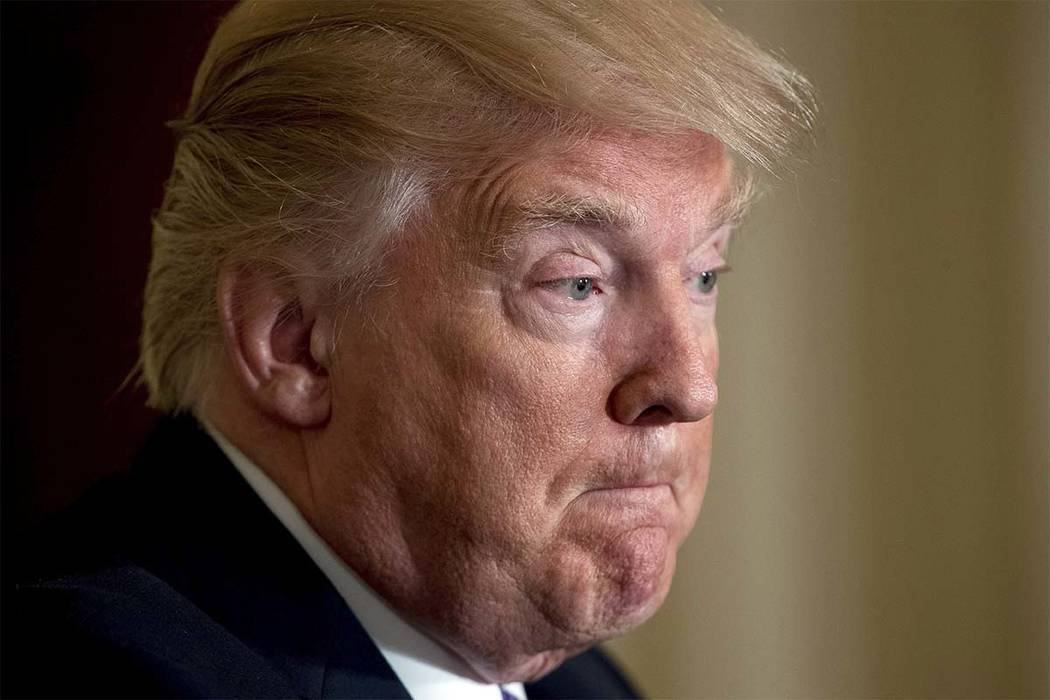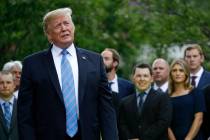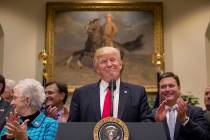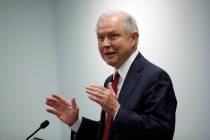COMMENTARY: Donald Trump’s foreign policy reversal sends a message to the rest of the world

The world is agog at Donald Trump’s head-snapping foreign policy reversal. He runs on a platform of America First. He renounces the role of world policeman. He excoriates parasitic foreigners that (I paraphrase) suck dry our precious bodily fluids — and these are allies!
On April 4, Trump declared: “I don’t want to be the president of the world. I’m the president of the United States. And from now on, it’s going to be America First.”
A week earlier, both his secretary of state and U.N. ambassador had said that the regime of Bashar Assad is a reality and that changing it is no longer an American priority.
Then last week, Assad drops chemical weapons on rebel-held territory and Trump launches 59 Tomahawk missiles into Syria.
This was, in part, an emotional reaction to images of children dying of sarin poisoning. And, in part, seizing the opportunity to redeem Barack Obama’s unenforced red line on chemical weapons.
Whatever the reason, moral or strategic, Trump acted. And effectively reset his entire foreign policy.
True, in and of itself, the raid will not decisively alter the course of Syria’s civil war. Assad and his Iranian, Russian and Hezbollah co-combatants still have the upper hand — but no longer a free hand. After six years of U.S. passivity, there are limits now and America will enforce them.
Nor was the raid the beginning of a campaign for regime change. It was, however, a reassertion of an American stake in both the conduct and the outcome of the war. America’s abdication is over. Be warned.
Moreover, the very swiftness of the response carried a message to the wider world. Obama is gone. No more elaborate forensic investigations. No agonized presidential handwringing over the moral dilemmas of a fallen world. It took Obama 10 months to decide what to do in Afghanistan. It took Trump 63 hours to make Assad pay for his chemical-weapons duplicity.
America demonstrated its capacity for swift, decisive action. And in defense, mind you, of an abstract international norm — a rationale that dramatically overrides the constraints of America First.
Trump’s inaugural address had boldly rejected the 70-year American consensus to bear the burdens of world leadership. Less than three months later, the Syrian raid abruptly changed that course with a renewed interventionism — not, to be sure, in the service of a crusade for democracy, but in the service of concrete strategic objectives, broadly defined and extending far beyond our shores.
To the North Pacific, for example. The Syria strike sent a message to both China and North Korea that Trump’s threats of unilateral action against Pyongyang’s nukes and missiles are serious. A pre-emptive strike against those facilities is still unlikely but today conceivable. Even more conceivable — perhaps even probable — is a shoot-down of a North Korean missile in flight.
The message to Russia was equally clear. Don’t push too far in Syria and, by extension, in Europe. We’re not seeking a fight, but you don’t set the rules. Syria shared the Sharyat base with Russian troops. Russian barracks were left untouched, but we were clearly not deterred by their proximity.
The larger lesson is this: In the end, national interest prevails. Populist isolationism sounds great, rouses crowds and may even win elections. But contra White House adviser Steve Bannon, it’s not a governing foreign policy for the United States.
Bannon may have written the come-home-America inaugural address. But it was the old hands, Trump’s traditionally internationalist foreign policy team led by Defense Secretary James Mattis and national security adviser H.R. McMaster, who rewrote the script with the Syria strike.
Assad violated the international taboo on chemical weapons. Who would enforce it, if not us? Candidate Trump would have replied: None of our business. President Trump brought out the Tomahawks.
His foreign policy has gone from mere homeland protection to defending certain interests, values and strategic assets abroad. These endure over time. Hence the fundamental continuity of our post-World War II engagement abroad.
With apologies to Lord Palmerston, we don’t have permanent enthusiasms, but we do have permanent interests.
And they have a way of asserting themselves. Which is why Bannonism is in eclipse.
This is not to say that things could not change tomorrow. We’ve just witnessed one about-face. With a president who counts unpredictability as a virtue, he could well reverse course again.
For now, however, the traditionalists are in the saddle. U.S. policy has been normalized. The world is on notice: Eight years of sleepwalking is over. America is back.
Contact Charles Krauthammer at letters@charleskrauthammer.com.












